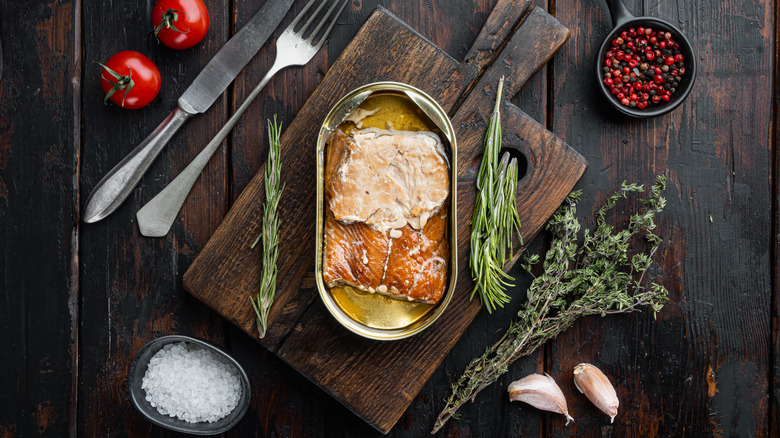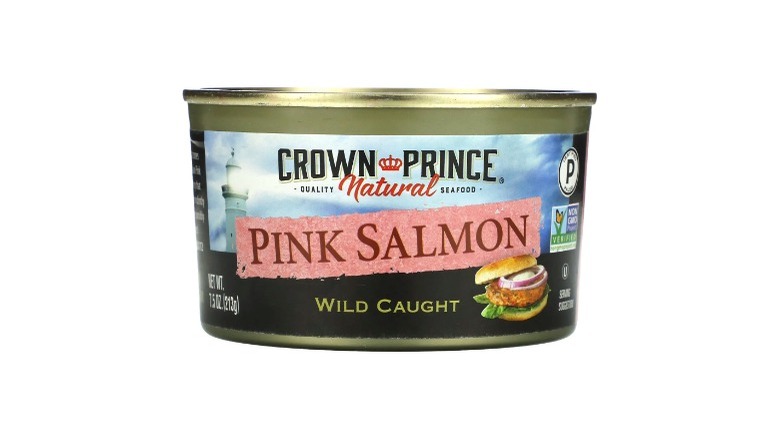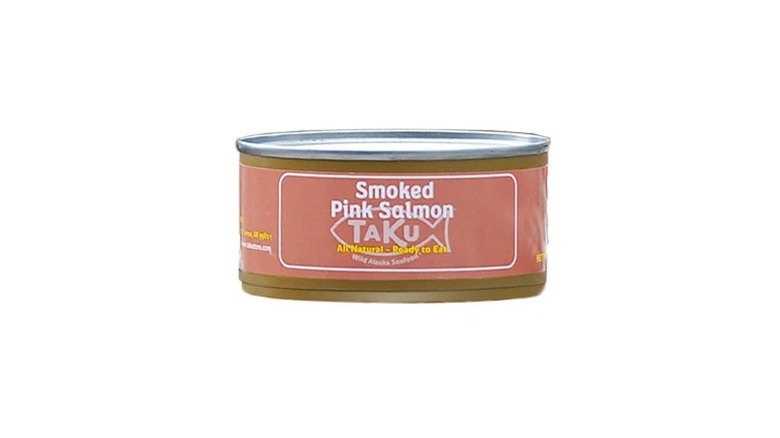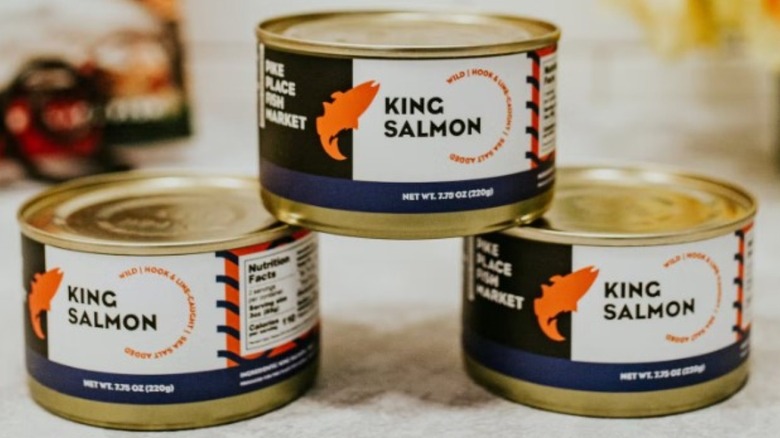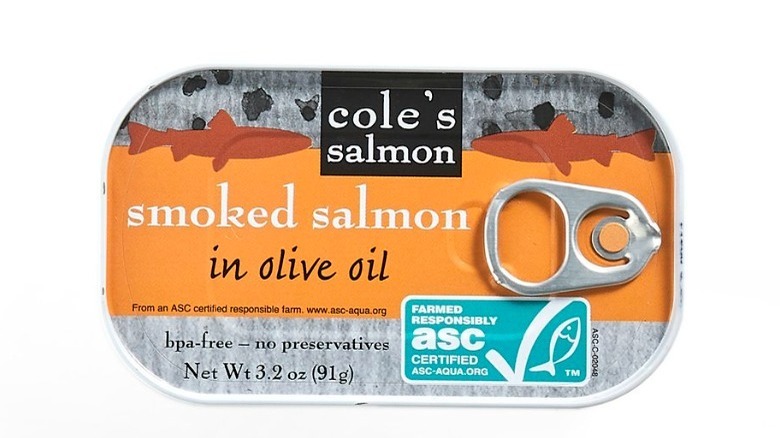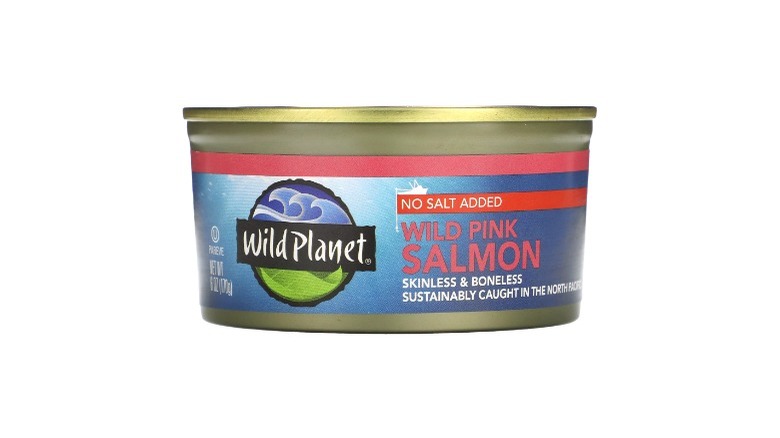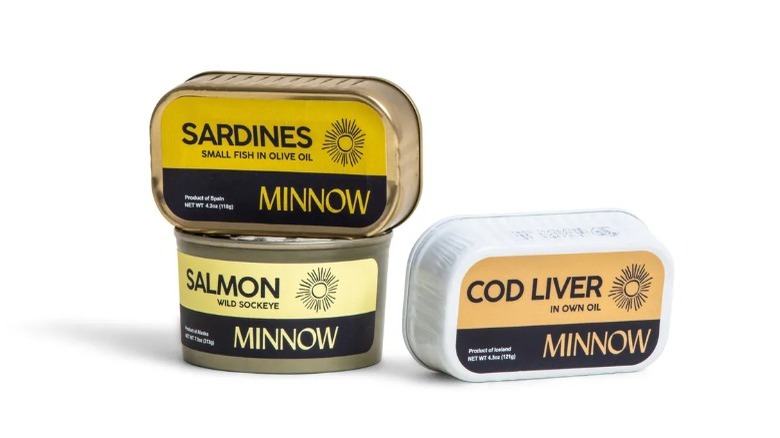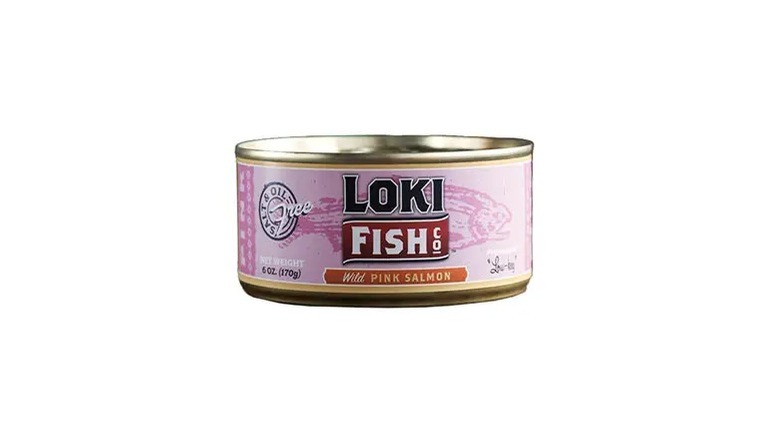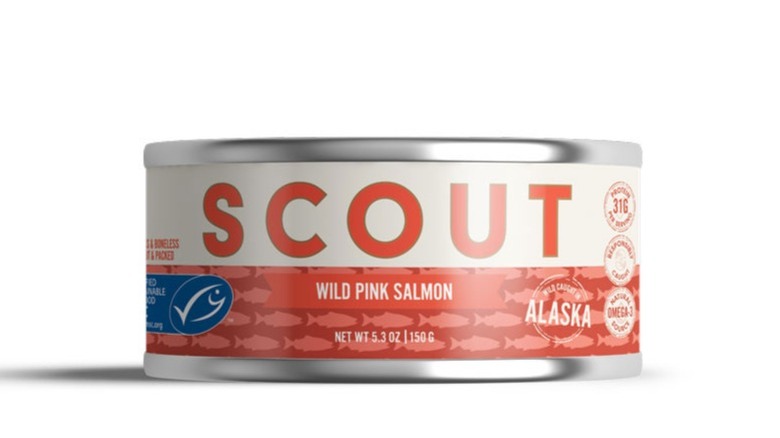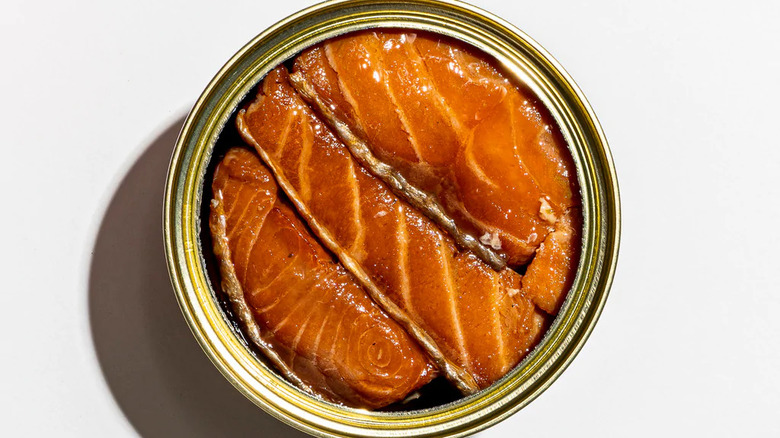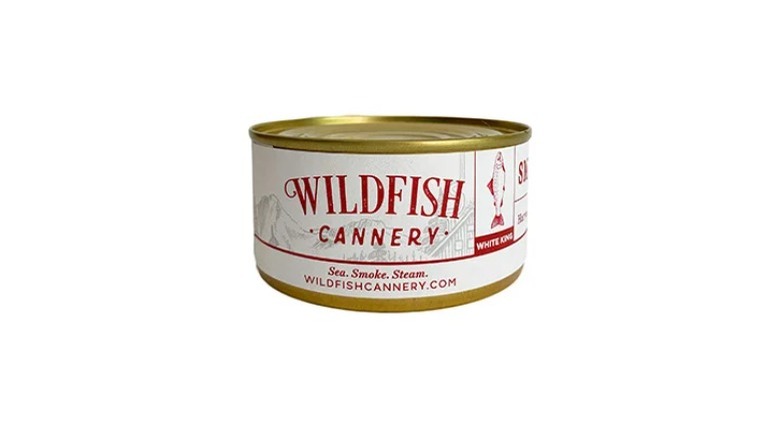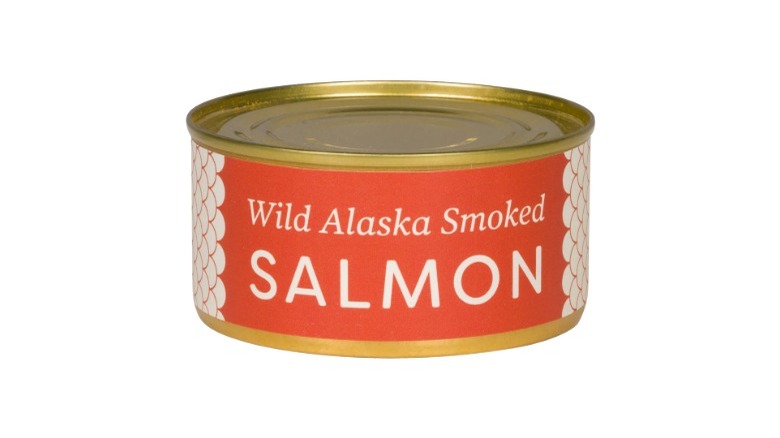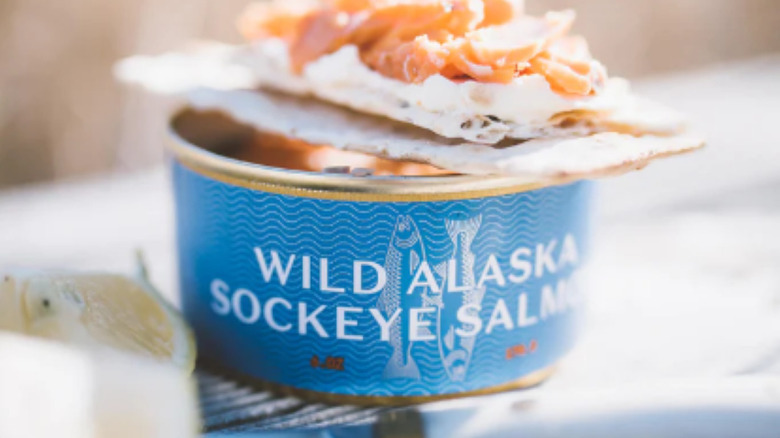The Ultimate Ranking Of Canned Salmon Brands
We may receive a commission on purchases made from links.
According to Smithsonian Magazine, canned salmon owes its invention, in part, to Napoleon Bonaparte, who offered a significant financial reward for anybody who invented a means of preserving food for his army. While this award was won by French scientist Nicolas Appert for his method of airtight food preservation, it was Englishman Peter Durand who first dreamed up the idea of using metal cans instead of glass jars to preserve food.
The production of canned salmon proliferated in areas where there was an abundance of the fish. One such area, the National Park Service reports, was America's Pacific Coast. Along this coastline, salmon was canned as a means of utilizing this bountiful resource and bringing a delicacy within the economic means of wider America. The new product proved extremely popular with Alaskan canners seeing their exports increasing by over 700,000 cases during the late 19th century (via Alaska Historical Society).
In the 21st century, the global canned salmon market is still growing. Some even predict it will be worth over $9 billion by 2032 (via PRNewswire). Such popularity has seen the market flooded with all manner of brands from the mass-produced to the incredibly artisanal. With growing concerns over how fish affects both environmental sustainability and personal health, carefully choosing which brand to buy has never been more important. Here, we aim to ease this selection process by highlighting brands that are producing exceptional canned salmon.
12. Crown Prince
One of the larger brands on this list is Crown Prince, a company that has achieved nationwide distribution via stores including Kroger, Trader Joe's, Walmart, and many more. Fortunately, the huge demand associated with such a vast distribution network has not diminished the quality of the final product as one reviewer on Amazon enthusiastically notes, "...this is one of the best brands of pink salmon we've tried. You can use this pink salmon for salad or salmon patties. It's good however you use it. I like the small can size because it is perfect for 2 generous servings with no leftovers..."
Yet, the large distribution network does pose some issues. Mostly, it results in the sourcing locations and methods of the salmon that end up in the cans being among the least transparent on this list. To the brand's credit, Crown Prince does highlight that pink salmon itself is defined as sustainable seafood by the Marine Stewardship Council and that all its salmon is sourced from an ASMI-certified salmon fishery. However, the lack of complete transparency compared to some competitors means that, despite their canned salmon being a high-quality product, Crown Prince didn't rank any higher on this list.
11. Taku Smokeries
Taku Smokeries is located in Juneau, Alaska, and as such has the privilege of being able to buy fish directly from locals who work the nearby water. While the inherent freshness of the salmon that ends up in the can are likely attributed to this location, other processes also play a key role. This is clearly demonstrated in Taku Smokeries' smoked king salmon, a canned product that is hot smoked with Alder wood.
According to Solex Catsmo, hot smoking is a process wherein fish are smoked at temperatures above 120 degrees Fahrenheit. This results in an intensely smokey flavor developing and a drier, flakier texture. Both of these make this particular type of smoked salmon superior for cooking as it can hold its own both texturally and when confronted with other strong flavors. As such, canned salmon purchased from Taku Smokeries is a valuable kitchen commodity and one that is incredibly flavorful at that. Add to this a very reasonable price point and it is not hard to see why Taku Smokeries has been included on our list.
10. Pike Place Fish Market
Despite being made famous for its fish-throwing staff, Pike Place Fish Market, Seattle also dabbles in some serious business, most notably sourcing and processing some of the world's most impressive fish (via Pike Place Fish Market). As a world-famous fish market, the brand's own line of fish products has to be seen as emulating the ethos of high-quality, fresh, and sustainable fish to the fullest. Co-owner Jaison Scott tells Bon Appétit, "We realized people were watching us from all over the world, and I don't know if we're used to it, but it made us realize how responsible we need to be as fishmongers. It was a scary thing to change, to become sustainable. And now we have people coming up and thanking us for it. Hanging out with people, educating them about fish, and then having a customer come back and tell us that we sold them the best piece of fish they ever had — that's the best part."
As reported by Goldbelly, the market does not sell any farmed salmon and this has been one of many items removed in order to improve sustainability. Instead, Pike Place Fish Market offers wild-caught canned king salmon. This is a brilliant product that demonstrates both the brand's commitment to sustainability and unbeatable quality.
9. Cole's Seafood
Another major brand that sells preserved seafood across the United States is Cole's. This brand has partnered with Geomar, a FairTrade-certified company that works directly with over 400 Chilean fishermen. Both Cole's is forthcoming with the fact that the salmon used in this particular range of canned products is farm-raised, a fact which might initially put some consumers off.
However, as Michelle Jaelin, a nutrition expert highlights, using farmed salmon can result in a final product that is more flavorful and one that is higher in healthy Omega 3 fatty acids to boot. She tells Livestrong, "Farmed salmon is higher in fat because of what they're fed. They are usually fed more grains, algae, and fishmeal in the farms, which increases their omega-3 fatty acid content. The skin of the fish is actually where you'll find the most omega-3 fats. It's like choosing between chicken breast and dark meat. Wild salmon is much leaner while farmed salmon holds flavors better because it has more fat. That's why chefs like to cook with farmed salmon."
On the other hand, food products made with farmed salmon may contain more contaminants which can be harmful to human health. This means that despite the quality of Cole's products, and its low price point of under $8, this brand didn't rank higher on our list.
8. Wild Planet
As sustainability has come to the forefront of public discourse in recent years, many individuals, brands, and organizations are having to come to terms with their own complicity in environmental abuses. This self-reflection was what inspired Bill Carvalho, a previous business owner in the seafood industry, to co-found Wild Foods. He tells Forbes, "I saw what was happening at ground zero of the seafood business. I saw what was happening at sea, the non-selective harvest where things are taken, sorted, you keep some — you dump the rest. It's an ignominious disgrace to pristine sea life. It violated my sense of reverence for ocean life."
Launched in 2005, Wild Planet has aimed to change the marine industry's relationship with the sea and has received widespread recognition as being one of the most sustainable, global canned seafood producers. So rigorous are its processes that Wild Planet has even been recognized for its sustainable practices by notoriously hard-to-impress organizations such as Greenpeace (via Business Wire). This is due, in part, to impressive features like the process performed in conjunction with Trace Register to track every haul of fish through its supply chain journey. Happily, this diligence is reflected in the quality of the final products with Wild Planet's canned boneless, skinless salmon being particularly popular, for reasons highlighted by an Amazon reviewer: "[It's] very very good, with real salmon flavor and texture. It truly is skinless and boneless, and in nice big chunks."
7. Minnow
Minnow is a very small brand that sells only a handful of excellent, preserved seafood items. The marriage of simplicity and prowess is one of the founding team of three, Nialls Fallon, Nick Perkins, and Leah Campbell. They perfected the craft when building their New York-based culinary empire together, including two notable restaurants, Hart's and Cervo's (via Grub Street).
As highlighted by Minnow, the fish used in the brand's sockeye salmon product is caught in Bristol Bay, Alaska. While the product itself is not certified, sockeye salmon caught in the region is seen as a study in sustainability. As a biologist that's managed fishing there, Tim Sands tells Marine Stewardship Council, "I think, at least for Bristol Bay, our escapement-based management is kind of the example worldwide for sustainable fisheries management."
By purchasing fish from those following the sustainable fishing practices enforced in Bristol Bay and wider Alaska, Minnow is directly supporting sustainable fisheries. To top things off, the final products are finished with sleek packaging and a reasonable price point, meaning Minnow offers consumers an accessible and sustainable means of indulging in luxurious fish. A fact that has undoubtedly drawn many self-proclaimed foodies to the brand.
6. Loki Fish Company
Loki Fish Company is a family-run brand that directly markets fish they have caught on their own two fishing vessels to the general public. A handful of further boats also contribute on occasion, with all using the same gillnet practices. The removal of nearly all intermediary handlers of the fish results in an incredibly short and transparent supply chain. It also ensures that the consumer knows that no environmentally damaging or socially questionable means have been used for the fish to be processed in cheaper labor zones. This is a practice that is incredibly common in America's seafood industry (via The Wall Street Journal).
The company also makes a point of stating that all the fish it uses are wild, being caught in a Marine Stewardship Council-certified fishery in southeast Alaska and a non-certified fishery in Puget Sound. With a product range that stretches from canned wild pink salmon to canned wild sockeye salmon in olive oil, there is an item that will appeal to every consumer whether a canned seafood skeptic or not.
5. Scout
Renowned Chef Charlotte Langley grew up on Canada's Prince Edward Island and is the Marine Stewardship Council's ambassador for Canada. So, she knows just about everything when it comes to the intersection between building sustainable oceans and creating outstanding food. This is an intersection she has targeted directly through the founding of Scout telling Chefs for Impact, "Scout was founded out of a desire to offer consumers nutritious, and delicious craft canned seafood. It gave me the opportunity to fuse my passions for cooking, label tracing, and sustainability. Our mission is to reduce food waste and protect the oceans."
Scout does this by utilizing sustainable, regional partners. In the case of Scout's canned pink salmon, this translates into the more environmentally-friendly gillnet and purse seine methods being used to catch the fish. Furthermore, all fish are sourced from MSC-certified fisheries.
The canned salmon is cured, air-dried, and finally smoked, ensuring the maximal expression of the fish's flavor. Packaged in beautiful boxes loaded with information, these products set the bar for what sustainable and delicious canned salmon should be. A fact that means Scout has more than earned its place on our list.
4. Fishwife
Thanks to the unsanitary and cruel conditions some farmed fish find themselves in, aquaculture has developed something of a bad reputation. However, Dr. Jesse Trushenski explains that modern society needs aquaculture telling Science Meets Food, "At this point aquaculture is necessary because many fisheries are already at their limits and there are no new fisheries being discovered. In order to have sustainable seafood we must minimize reliance on limited resources and the impact on the environment [...] It's not a question of farm-raised OR wild-caught, we should eat farm-raised AND wild-caught fish."
Fishwife is a brand that is demonstrating the full potential of aquaculture through products such as its canned smoked Atlantic salmon. Sourced from Kvarøy Arctic, a Norwegian aquaculture company, which alongside a slew of certifications, provides data highlighting the sustainability of their farms. These include a smaller carbon footprint and less land use.
Numerous five-star reviews attest to the quality of Fishwife's canned salmon with one reviewer stating, "I've had canned salmon before, but never like this. Fishwife is different. You could honestly just serve this straight from the can on a few slices of good bread or bagels and your guests would be impressed. I have and they were!"
3. Wildfish Cannery
Since 1987, Wildfish Cannery has been nestled in the town of Klawock, Alaska (via Wildfish Cannery). Here, the cannery has built upon the area's long history of seafood canning to produce a range of products that are created using several time-consuming, non-mechanized processes, These include catching their salmon using hook and line methods on the open ocean. This, along with a focus on quality and not quantity, is what founder, Mathew Scaletta, believes makes his canned salmon superior to other, less artisanal options. He tells Taste, "A lot of this stuff really isn't bad, for what it is. But, of course, with production at that [industrial] scale, it's all about producing as many cans as cheaply as possible, so the small details that can make good food great are going to be overlooked for the sake of profit."
Wildfish Cannery has also gained acclaim thanks to its distribution of Alaskan delicacies such as white king salmon. This is a rare variant of the king salmon that makes up approximately 5% of the entire king salmon population (via Alaska Department of Fish and Game). The variety is deemed richer and more flavorsome, making it a must-try for curious consumers all across the United States.
2. Salmon Sisters
Sibling duo Emma Teal Laukitis and Claire Neaton have created a sustainable, socially supportive seafood business, known as Salmon Sisters, from their home in Alaska's remote Aleutian Islands. Here, they are perfectly located to fish for wild coho salmon in the Bering Sea, Gulf of Alaska, and Southeast Alaska (via Alaska Seafood). As highlighted by NOAA Fisheries, coho salmon are deemed an extremely sustainable fish stock thanks to the management principles enshrined in the Alaska state constitution and the well-enforced fishing systems that have arisen from it. This means by virtue of using coho salmon, Salmon Sisters' products are inherently sustainable.
The small, transparent company catches wild salmon using only tender, seine, and gillnet methods. This way, consumers can rest assured that their purchased fish is fresh, healthy, and environmentally sound. Furthermore, the luxurious canned salmon offered by Salmon Sisters is processed by Wildfish Canning, another brand that has sustainability at its heart.
Finally, Salmon Sisters has a reputation for supporting social causes as well as environmental ones. Co-founder, Emma Teal Laukitis explained to Forbes, "1% of our net profit is set aside to purchase wild seafood caught by Alaskans, which we donate to the Food Bank of Alaska, supporting both fishermen harvesting this delicious wild protein and those who need it most. Salmon Sisters has donated over 130,000 cans of wild salmon caught by fishermen in Alaska to the Food Bank of Alaska, which distributes our donation across the state."
1. Drifters Fish
At the top of our list is Drifters Fish which, diverging from many other brands previously included, preserves its salmon in reusable jars as well as cans. Launched by a married couple, Michael and Nelly Hand, Drifters Fish is a small, family-owned business. They pride themselves on the fact that the sockeye, coho, and keta salmon preserved in their jars and cans are caught by the founder's very own fishing vessel. This ensures that every salmon which is pulled from Copper River Watershed, Alaska via gillnetting is treated, and processed to Drifters Fish's exacting desires. Unsurprisingly, the resulting products are excellent, demonstrating the clear, complex flavors of truly wild salmon.
As a company with sustainability at the forefront of its mind, it is not surprising that Drifters Fish goes above and beyond the usual sustainability practices employed by other companies. The company donates 1% of annual sales to the Copper River Watershed Project which preserves local habitats, cultures, and communities. They also donate another 1% to the Prince William Sound Stewardship Foundation, an organization with the mission of keeping Prince William Sound healthy. The company's old nets are recycled or repurposed and even the fishing gear worn by the couple is eventually upcycled.
